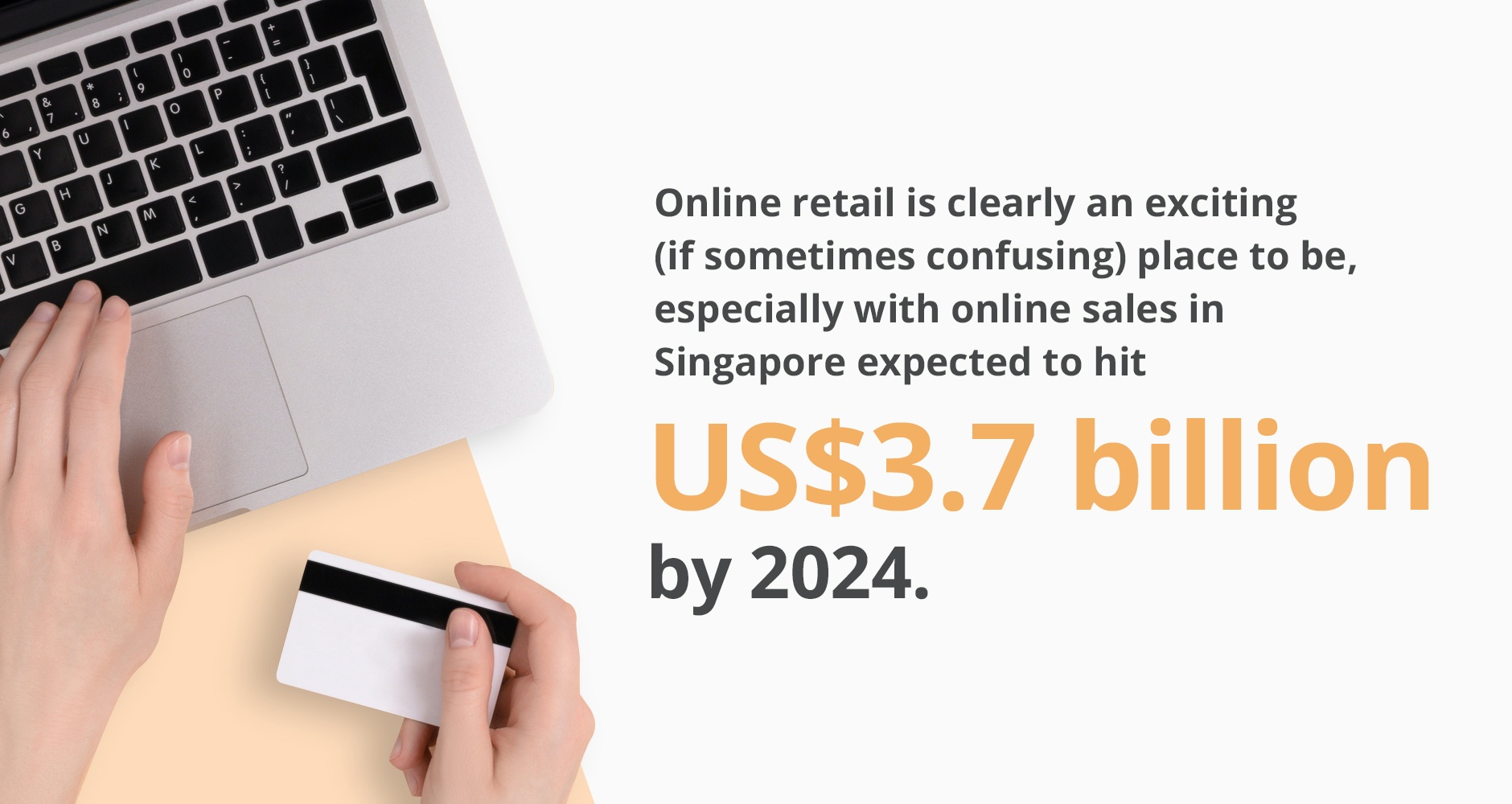Has COVID changed the retail industry forever?
Has COVID changed the retail industry forever?
As a retailer emerging from the lockdown, you might be asking yourself if you have what it takes to survive. There's no easy answer but in some ways, nothing has changed.
You're still facing an exciting digital future that will use a mix of e-commerce, social media and experiential physical locations to satisfy the demands of modern consumers. The pandemic just made things change faster than anyone expected.
Retailers around the world are adapting. Are you?
Livestreaming takes over
Meet Viya, the 34-year-old queen of China's livestreamers. She's done over S$500 million of sales to almost 40 million people. She also sold a rocket, netting almost S$8 million for a product that is truly out of this world.
Viya and other livestreamers are using the Internet and widely available technology to speak directly to consumers who are wary of advertising. They use their reputation to connect with buyers and tell a brand's story in a way that's personal and immediate, much like a friend showing you their new shoes.
The results are astounding. Livestreamers in China will generate S$180 billion of sales this year, helping the country overtake the US as the world's biggest retail market for the first time.
And the trend hasn't gone unnoticed in Southeast Asia either. In April, Lazada attracted over 27 million viewers to its livestream portal LazLive. It expects that to jump another 40% by the end of June.
Even the Singapore government is getting involved. It recently teamed up with livestreamer Max Kee to help retailers at Tekka market sell their produce online. From fresh fish to Facebook, traditional retailers are really stepping up to the challenges — and opportunities — of the digital economy.
Selling is social
This is just the beginning.
Another trend driving shoppers today is social commerce. Amazon and other online giants have dominated e-commerce but the companies that dominate the Internet — the social media platforms like WeChat and Instagram — are taking notice.
And, again, China is in the lead.
Social commerce sales in China will hit 11.6% of total e-commerce revenue in 2020 with about a third of its 1.4 billion population using the social platforms, adding up to an incredible S$340 billion of sales this year.
We spend most of our Internet time on social media platforms like Facebook and Instagram — about 2.5 hours a day and rising. And if you want to reach the up-and-coming Generation Z, which already accounts for 40% of all consumers worldwide, social is a key place to be.
One of the best ways to speak with customers on social media is via an Influencer, the online celebrities who provide a third-party face for your brand or store. But it's not the easiest industry to navigate.
From the queen of Influencer marketing, Kylie Jenner, who charges $1 million a post, to micro and nano Influencers who may have just a thousand followers, you have to be careful who you choose to represent your brand.
To filter out the bad from the good, some due diligence on their audiences is required with sites like HypeAuditor and trendHERO.

Source: Statistica, 2020
Bullish on brick and mortar
Let's not forget offline. While trends like livestreaming and social commerce get all the headlines, physical stores are still the place where most people go shopping. Walmart is banking on it. They're so confident about offline shopping they're even investing in Wuhan, plunking down almost S$600 million on new stores in the city over the next five years.
Successful e-commerce businesses are also noticing, because of the atmosphere and thrill an in-person retail experience offers. Just ask the local online fashion sensation Love, Bonito, which opened a 6,000 square foot store at Funan Mall that provides luxurious fitting rooms, an augmented reality walkway and a mirror room for perfect Instagram shots.
For retail SMEs that don’t want to splash out on a large space and a long lease, there's an exciting new trend for online retailers and emerging brands alike — the pop-up store.
Increasingly popular in places with high rents like London, New York and Tokyo, a pop-up is a small physical footprint that lets customers touch the product and hear the brand story from knowledgeable staff.
Pop-ups come in many different shapes and sizes, from pop-ins like the Facebook shops in Macy's to purely experiential experiences that sell a vibe rather than the product itself.
Pop-ups don't even need to be staffed as SingTel has shown with its roving kiosks that let people test phones, sign up for plans and collect purchases with the help of a live chatbot and facial-recognition technology.
A helping hand
Not everyone has adjusted to the changing retail landscape so quickly. While many Singapore retailers have already adopted click-and-collect services, seamless mobile ordering, and sophisticated omnichannel commerce that put them at the forefront of the digital revolution, others have not.
The local department store BHG for example, didn't launch its online site until a couple days before Phase 1 ended.
So to move even more retailers online, the government unveiled an E-commerce Booster Package that helps retailers navigate online sales here and abroad while upping their digital marketing game. There's even help with staffing costs in which the government will provide up to 90% of labour expenses for three months as they transition online.
Amazon is one of the newest entries into Singapore's e-commerce scene and it is also stepping up efforts to get local sellers involved. It recently launched a Seller University in Singapore that provides retail SMEs with an interactive portal to master the tips and tricks of doing business on Amazon.sg.
From chatbots to pop-ups, Influencers and livestreams, the language of retail is changing almost as fast as retail itself. We're seeing century-old retail icons being swept aside while digital clothing and virtual reality celebrities take their place. It's enough to make your head spin.
As frightening as some of these changes are, it's also an incredibly exciting time. People are shopping more than ever while seeking more intimate and meaningful connections with brands and stores.
Incredible opportunities await, and luckily, there’s a lot of support from the Singapore government to propel your business into the new normal.
-
E-Commerce Booster Package: Retailers can seek help to set up online sales here and abroad while getting assistance for digital marketing. With our exclusive partnership with Amazon, an addition to being able to claim 90% of the qualifying costs needed to set up your operation, OCBC customers get a one-time S$100 account rebate and S$1,500 in credit for Amazon Web Services.
-
Rental Relief Framework for SMEs: Occupying tenants, including subtenants and licensees, can apply for a total of 4 months’ waiver of base rental for qualifying commercial properties such as shops.
-
Wage Credit Scheme: An enhanced program to help businesses with wage costs while dealing with the impact of social distancing.
-
Corporate Income Tax Rebate and Payment Deferment: A 25% corporate income tax rebate and a three-month deferment for corporate tax payments.
-
Property tax rebate: An enhanced rebate for non-residential properties through to the end of the year.
-
Productivity Solutions Grant: An enhanced grant to encourage enterprises to continue their digitalisation and productivity upgrading efforts. The maximum funding support level will be raised to 80% from 1 April 2020 to 31 December 2020.
Disclaimer
You may be directed to third party websites. OCBC Bank shall not be liable for any losses suffered or incurred by any party for accessing such third party websites or in relation to any product and/or services provided by any provider under such third party websites.
The information provided herein is intended for general circulation and/or discussion purposes only. Before making any decision, please seek independent advice from professional advisors. No representation or warranty whatsoever in respect of any information provided herein is given by OCBC Bank and it should not be relied upon as such. OCBC Bank does not undertake any obligation to update the information or to correct any inaccuracy that may become apparent at a later time. All information presented is subject to change without notice. OCBC Bank shall not be responsible or liable for any loss or damage whatsoever arising directly or indirectly howsoever in connection with or as a result of any person acting on any information provided herein. Any reference to any specific company, financial product or asset class in whatever way is used for illustrative purposes only and does not constitute a recommendation on the same.
Discover other articles about:



